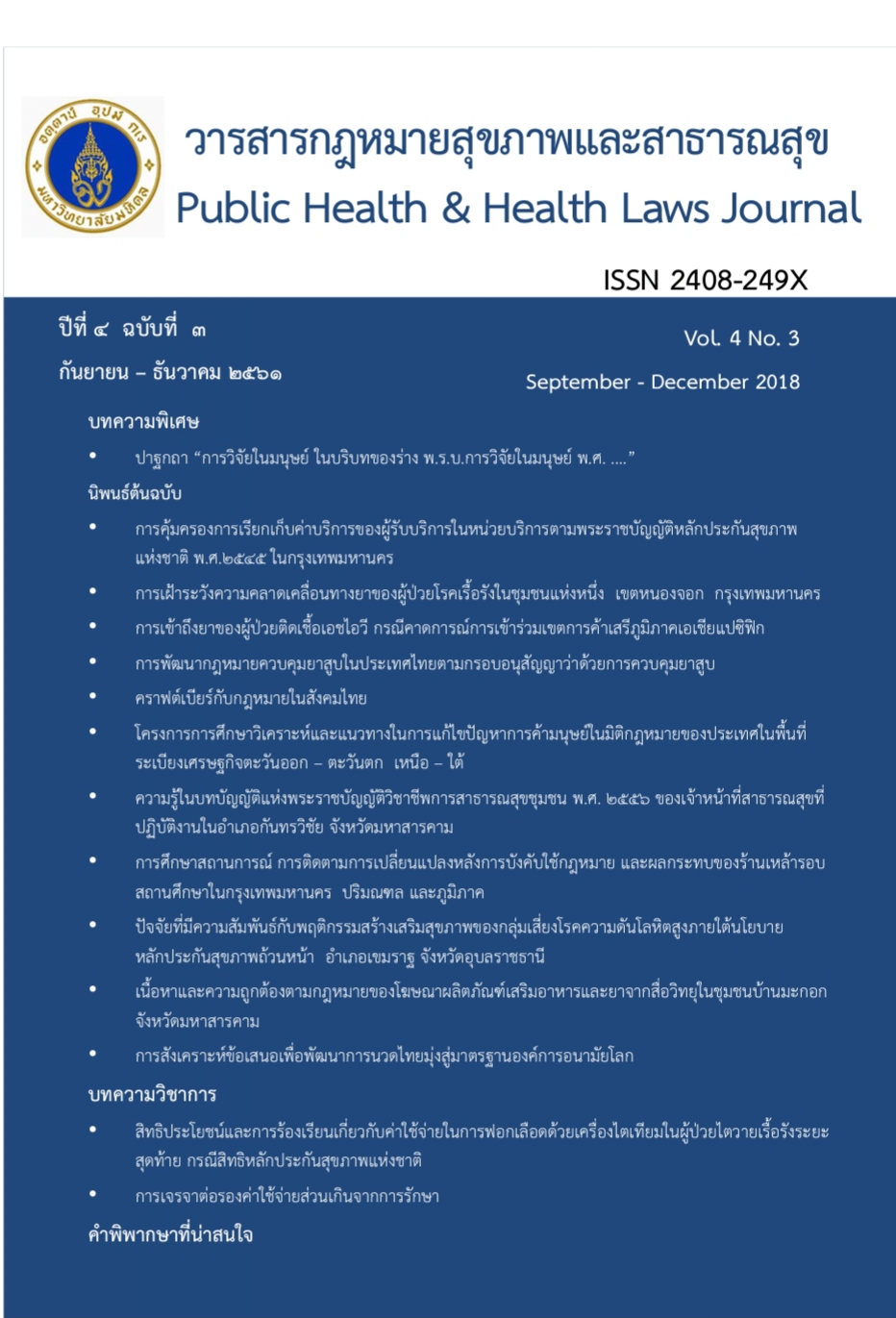PROTECTION FOR SERVICE-FEE COLLECTION BY HEALTH CARE PROVIDERS IN HEALTH SERVICE UNITS ACCORDING TO THE NATIONAL HEALTH SECURITY ACT OF B.E.2545
Abstract
This is a qualitative research that aimed to study guidelines and processes in fee collecting staff in health service units in accordance with the National Health Security act of B.E. 2545 via semi-structured interview. The sample consisted of 10 staff members of the health care unit with the highest number of complaints in the year 2015 and 2 administrators of the National Health Security Office.
The results revealed that health care units have guidelines and processes in collecting fees for non-essential drugs or medical tools that fall outside the pick-list from the patients instead of collecting themselves, without negatively affecting its financial situation. The health care unit will inform patients before using it. If a patient is unable to pay, the doctor will change to use essential drug or medical devices in order not to affect health service units. In case of referral patient, the management will apply the same concept but make additional agreement with their personal health care unit before using non-essential drugs or medical devices. On the other hand all providers will collect drug or medical device expenses that patients request. When there are complaints, some health service units will refund all complainers to minimize the effect. However, some health service units will refund in case there is no conflict with their policy. When health service units receive orders according to section 59(2), they will refund to complainers and adjust guidelines and processes to prevent complaints from occurring again, and send a circular to all health service units. The National health security organization have to approve that the control measures are appropriate and inform all other health service units accordingly.
The study recommends that there should be particular supporting funds for medication costs and medical tools that are not included in the “pick list” for the medical research purposes. It also recommends that the service-fee collections in hospitals and the up-to-date and more attractive disbursement system should be controlled by all stakeholders. Notification on the outcome of any decision of the Standard and Quality Control Board concerning the patient complaints should be made by the health care units.
References
ชัยรัตน์ เอี่ยมกุลวัฒน์. (2557). เศรษฐศาสตร์สาธารณะ. [อินเตอร์เน็ต]. [เข้าถึงเมื่อพฤษภาคม 2561].เข้าถึงได้จาก http://pioneer.netserv.chula.ac.th
ชูชัย ศรชำนิ. (2558). กลยุทธ์การบริหารการเงินการคลังภาคบริการสุขภาพ. [อินเตอร์เน็ต]. [เข้าถึง เมื่อพฤษภาคม 2561].เข้าถึงได้จาก http://www.stou.ac.th
โชติช่วง ทัพวงศ์. (2560). คู่มือนักเจรจาไกล่เกลี่ย. (พิมพ์ครั้งที่ 2). กรุงเทพฯ: ศูนย์สันติวิธีสาธารณสุข สำนักงานปลัดกระทรวงสาธารณสุข
ทิพาภรณ์ โพธิ์ถวิล และคณะ. (2551). กลไกและกระบวนการจัดการเรื่องร้องเรียนและการช่วยเหลือเบื้องต้นแก่ผู้ป่วยในระบบหลักประกันสุขภาพ. คณะสังคมสงเคราะห์ศาสตร์และ สวัสดิการสังคม มหาวิทยาลัยหัวเฉียวเฉลิมพระเกียรติ.
ธเนศ ศรีวิชัยลําพันธ์. (2558). ทฤษฎีเศรษฐศาสตร์จุลภาค 2 (Microeconomic Theory II). คณะเศรษฐศาสตร์ มหาวิทยาลัยเชียงใหม่.
นันทวัฒน์ บรมานันท์. (2555). มาตรฐานใหม่ของการจัดทำบริการสาธารณะระดับชาติในประเทศไทย. พิมพ์ครั้งที่ 2. กรุงเทพมหานคร. สำนักพิมพ์วิญญูชน.
สำนักงานหลักประกันสุขภาพแห่งชาติ. (2555). กฎ ระเบียบที่ออกตามกฎหมายว่าด้วยหลักประกันสุขภาพแห่งชาติ. กรุงเทพมหานคร.
สำนักงานหลักประกันสุขภาพแห่งชาติ. (2561). รายงานการสร้างระบบหลักประกันสุขภาพแห่งชาติ ประจำปีงบประมาณ 2560. กรุงเทพมหานคร. ห้างหุ้นส่วนจำกัด แสงจันทร์ การพิมพ์
สำนักยา สำนักงานคณะกรรมการอาหารและยา กระทรวงสาธารณสุข. (2556). บัญชียาหลักแห่งชาติ พ.ศ.2556. กรุงเทพมหานคร. โรงพิมพ์ชุมนุมสหกรณ์การเกษตรแห่งประเทศไทย จำกัด
สุรจิต สุนทรธรรม และคณะ. (2555). ระบบหลักประกันสุขภาพไทย. กรุงเทพมหานคร. สำนักงานหลักประกันสุขภาพแห่งชาติ.
Downloads
Published
How to Cite
Issue
Section
License
Disclaimer and Copyright Notice
The content and information presented in articles published in the Journal of Law and Public Health Policy represent the opinions and sole responsibility of the respective authors. The editorial board does not necessarily agree with or assume any responsibility for the views expressed.
All articles, data, content, images, and other materials published in the Journal of Law and Public Health Policy are the intellectual property of the journal. Any individual or organization wishing to reproduce, distribute, or otherwise use the entirety or any part of such materials must provide proper citation.





